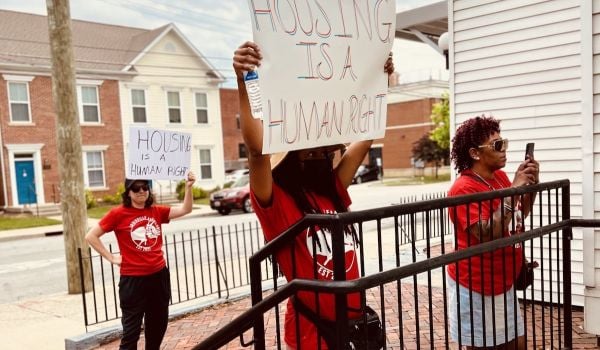Campaigns for rent control and tenant protections that have been simmering for years in high-cost cities have managed to break through to the national level in the last few months. Two progressive coalitions with roots in tenant organizing, centered around People’s Action in Chicago and the Center for Popular Democracy in Brooklyn, launched campaigns with overlapping demands. The “Homes Guarantee” campaign, convened by People’s Action, calls for the development of 12 million “social housing” units to be owned publicly and rented at rates that anyone can afford, regardless of income. The “Home to Thrive” platform, which the Center for Popular Democracy brought to Congress in September, demands a range of federal protections, including national rent control and a ban on evictions without just cause. The demands are picking up champions in public office.
Last week, U.S. Rep. Alexandria Ocasio-Cortez, whose New York district includes parts of the Bronx and Queens, introduced a package of bills called “A Just Society,” laying out a vision of “shared prosperity for all.” One of the bills would create a national rent control policy barring yearly rent increases of more than 3 percent, prohibit evictions unless a tenant has broken the terms of the lease or failed to pay rent for two consecutive months, prohibit housing discrimination based on the tenant’s source of income, and adjust federal aid for highway projects based on whether the jurisdiction in question promotes “equitable growth.”
“We wrote it, from start to finish,” says Dianne Enriquez, the Center for Popular Democracy’s co-director of community dignity campaigns. Enriquez notes that Ocasio-Cortez approached the Center with an interest in backing housing policies that were “driven and defined by community leaders and tenants.”
One of those policies is rent control. Earlier this year, the Center contributed to a report called “Our Homes, Our Future,” which noted that universal rent control in the U.S. could immediately protect 42 million renter families. California and Oregon both adopted anti-rent gouging laws this year that cap annual increases at the rate of inflation — calculated as the local consumer price index — plus 5 percent for California and 7 percent for Oregon. With a roughly 2.5 percent CPI in the western U.S., that adds up to between 7.5 and 9.5 percent each year. Most yearly increases fall below that rate, even in California and Oregon. Ocasio-Cortez’s proposal instead would implement a national cap at the average rate of inflation for all cities — 1.7 percent this year — or 3 percent, whichever is higher.
“I think with a champion like AOC, there’s no reason for mitigation or compromise,” Enriquez says. “Rent control is the demand that tenants and tenant organizers have been lifting up, and we finally have champions at the federal level that are willing to carry the flag.”
A lot of economists and landlords say tight rent controls like the one the bill would impose are bad for housing markets, arguing they disincentivize property improvements and new development, and decrease housing supply and increase rent over time, as Kriston Capps recently explored at CityLab. But many families are already paying too much for rent, according to the Joint Center for Housing Studies of Harvard University — including 83 percent of extremely low-income renters and a quarter of renters who earn between $45,000 and $74,999 a year.
As Next City reported in April, grassroots momentum behind rent control campaigns has grown quickly this year, more quickly than even some of its main advocates imagined.
Sarah Treuhaft, managing director at PolicyLink and a co-author of “Our Homes, Our Future,” notes that report promoted universal rent control as a tool to stabilize families, but that it didn’t envision a national rent control policy. Instead it highlighted existing state and local campaigns, and called for state-by-state campaigns around the country. That’s because, even just nine months ago when the report was released, it was hard to imagine national rent control getting any federal traction. Recently, polling by the progressive Data for Progress suggested that most respondents support a national tenants’ bill of rights that includes universal rent control.
“There is just this incredible momentum behind tenant protections and bolder solutions for our renter crisis,” Treuhaft says. “It’s exciting to see these proposals around national rent control policies. I think it shows you that the field is changing and the possibilities are changing for rent control.”
New York expanded rent control earlier this year, after intense pressure from tenant organizers and the organization of an Upstate/Downstate Alliance pushing for more tenant protections in big and small cities. Many of the groups behind that effort are also advocating for tenant protections at the national level. Winsome Pendergrass, an organizer with New York Communities for Change, which was central to the New York campaign and is part of the coalition with the Center for Popular Democracy, says it was invigorating to get support for tenants in Albany, and that it’s gratifying to see the cause being taken up in Congress. During the Albany campaign, Pendergrass says she was exposed to people facing a range of housing challenges beyond those she and her neighbors struggle with in Brooklyn.
“To me it is really something great and really something wonderful to see that we wrote the laws that we want, the laws that represent black and brown people, and at least somewhat, we got it,” Pendergrass says.
Pendergrass says she was chosen by her fellow organizers to ask presidential candidate Julián Castro during an online town hall event whether he’d support nationwide tenant protections if he were elected president. Tenants’ groups have been trying to talk with every presidential candidate who is willing, and have recently gotten some traction with the Bernie Sanders campaign, which released a far-reaching housing proposal in September. And they hope that even if the package of bills introduced by Ocasio-Cortez isn’t adopted as is, it can push the housing debate toward more progressive solutions.
“We’re at a place where there’s a lot of alliances and relationships and growth happening that people that have been around housing justice organizing longer than I have, think is unprecedented,” Enriquez says. “And it’s all centering around our legislative champions. For the first time in a long time we have some real leadership that is willing to go out on a limb and say no to corporate power.”
This article is part of Backyard, a newsletter exploring scalable solutions to make housing fairer, more affordable and more environmentally sustainable. Subscribe to our weekly Backyard newsletter.

Jared Brey is Next City's housing correspondent, based in Philadelphia. He is a former staff writer at Philadelphia magazine and PlanPhilly, and his work has appeared in Columbia Journalism Review, Landscape Architecture Magazine, U.S. News & World Report, Philadelphia Weekly, and other publications.
Follow Jared .(JavaScript must be enabled to view this email address)


















